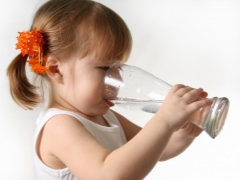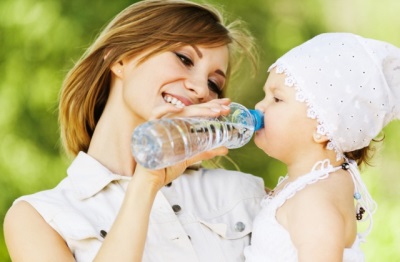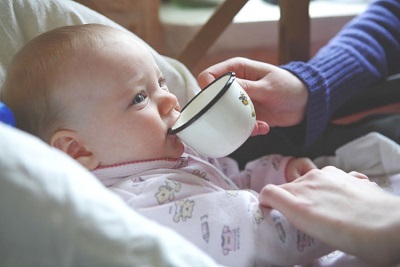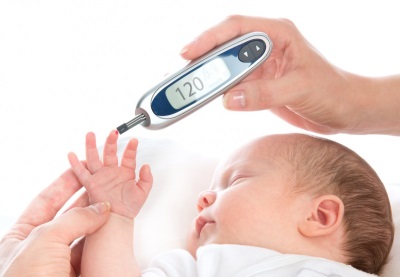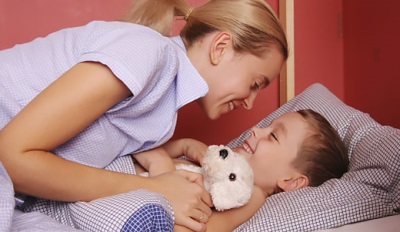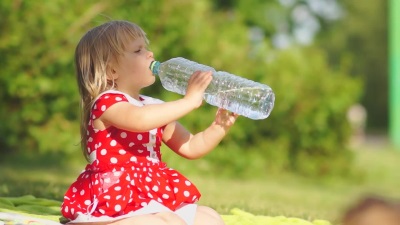Should I worry if the baby drinks a lot of water?
Attentive mother will always notice that the child began to drink a lot more water than before. This situation is often disturbing, because it can be caused by very harmless factors and serious pathologies. Why then can a child drink too much water and what should parents do in this case?
How much should a child drink normally?
Each of the babies is individual, so someone drinks little water and does not experience dehydration, but someone needs more fluid.. Nevertheless, the doctors determined the average indicators of children's water needs (not only in clean water, but also in water as part of food), which are age norms for each kilogram of weight:
- Newborns need 90-130 ml of fluid.
- Children aged 3 months need 150 ml of liquid.
- A chest baby at the age of 4 months should receive fluid in a volume of 140 ml. The same rate is defined for babies who are 5 months and 6 months old.
- Children 7-9 months need to receive 130 ml of liquid.
- One year old baby needs 125 ml of liquid.
- At 2 years old, the baby needs about 100 ml of liquid.
- Children 3-6 years old need to drink 60-80 ml per day.
- Schoolchildren on average require 50 ml of liquid.
The increase in these indicators is possible under the influence of sports, changes in the type of food, increased temperature in the room, hot seasons, too dry air, the child's health and other factors.
Watch a video in which Dr. Komarovsky answers questions regarding the rate of fluid consumed by a baby:
Moreover, water can be given directly from the refrigerator, which will harden the neck of the baby. See the next video for more details.
Why does a child drink a lot?
Increased thirst in a child makes it more often applied to the chest, constantly drink food, ask for water before going to bed. Causes of overuse of water by a child can be both physiological and caused by health problems. You can understand them by observing the baby more carefully and, if necessary, by consulting a doctor.
Increased thirst is caused by such physiological factors:
- Changing weather conditions. In the summer heat, many children drink more, but refuse to eat thick food. This is absolutely normal, because hot weather causes increased water losses due to sweating.
- Microclimate in the room. Increased fluid intake can also occur in winter, when the air in the apartments and houses is heated and dry due to heating. Also, the child may want to drink more while swimming, when his body warms up in warm water. This is one of the reasons why a child drinks water from a bath when bathing.
- Exercise. Very mobile kids and children who play sports will drink more than tots that play quietly.
- Nutritional changes. When a child is transferred to mixed or artificial feeding, his needs for water increase. Also, more water is needed to children who are beginning to lure. If a baby on a common table eats a lot of dry food, his fluid requirements will be compensated for by a heightened interest in drinking. Thirst can be provoked by the use of fatty, sweet or salty foods.
- Food without appetite. If the food does not cause the baby to want to eat it and does not release enough saliva, the child will drink during the meal in order to quickly chew the dish and swallow it.When the baby has eaten something unloved, copious drinking after a meal is used to get rid of the aftertaste.
- Consuming sugary drinks. If the child is constantly given sweetened drink, the crumb will not be able to completely quench his thirst and will soon be asked to drink more. In this case, the usual water will be discarded by the peanut, having become accustomed to sweet tastes.
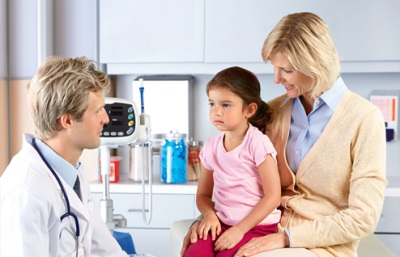
The child may often drink due to psychological factors:
- Out of habit. It happens that a small child becomes attached to a drinking bowl or a bottle, which is why he often drinks in small portions from his favorite container. Weaning a baby from such a habit is possible by constantly offering water from a cup or glass.
- Due to lack of attention. Sometimes the baby drinks more at night and drinks water moderately during the daytime because it tries to attract the attention of the mother in this way. This situation is quite common after the completion of breastfeeding, when the crumb stopped receiving her mother's breast at night, but still has a need for it.
- Due to nervous strain. If a child has started going to kindergarten, is very worried because of parents' quarrels, is experiencing increased workload at school or is under the influence of other stressful factors, this may cause an increase in thirst.
- Because of the reluctance to go to sleep. The situation when the crumb does not really want to sleep and begins to invent what he wanted to drink, is quite common. In this case, the peanut before bedtime may drink more than usual.
Increased water intake can also cause various diseases, including:
- Diabetes insipidus. One of the main symptoms of this disease of the pituitary gland is an increase in the volume of fluid consumed. Also, in a sick child, polyuria is noted - the release of a larger volume of urine.
- Pathology of the kidneys. Such diseases may be accompanied by increased urine excretion per day, to compensate for which children begin to drink more water. Other symptoms, such as lethargy, pallor of the skin, swelling of the legs, fever, back pain, and others, may indicate urological problems.
- Diseases of the liver or disorders in the gallbladder. They can cause bitterness in the mouth, to eliminate which children drink more.
- Worm infestation. Other symptoms, such as abdominal pain, changes in appetite, itching in the area of the anus, nausea, changes in mood, and stool disorders, are added to increased thirst during infection with parasites. Sometimes the worms do not show themselves, and only tests will help identify them.
- Diabetes. Signs of such a serious endocrine disease are frequent drinking and an increased number of visits to the toilet. In children with diabetes, fatigue, muscle weakness, increased appetite, and the desire to eat sweets are also noted. Such babies sweat a lot, complain of itchy skin, lose weight, and the wounds on their skin heal poorly.
What to do?
If the baby began to drink more than usual, first you need to determine whether any of the physiological or psychological factors affect him. To do this, you can:
- Normalize the microclimate at home. In the room where the child resides, should be the optimal temperature (doctors recommend 18-22 degrees of heat) and humidity above 50%. In such conditions, the loss of moisture through the skin and mucous membranes will be reduced.
- Correct the baby's nutrition. Take a closer look, whether the child consumes a lot of fatty or dry foods, whether the menu is too salty or sweet. Also try to limit the sweet drink in the diet of children. Gradually dilute the juice or compote so that the proportion of pure water among the liquid consumed by the child increases.
- Affect the psychological environment. Protect the child from the quarrels of adults and pay more attention to the crumbs. Take care also that your daughter or son fall asleep in comfortable conditions and in a good mood.
If none of these actions have had an effect, and the crumb continues to drink plenty of water, you should contact your pediatrician. Before the visit, calculate how much your baby consumes fluids, and also determine the volume of his daily urine. After evaluating such data and examining the child, the doctor will prescribe the necessary additional research to rule out diseases that provoke thirst.
Do not hesitate to ask for medical help with such symptoms:
- The child drinks a lot of water and constantly sweats. The sooner you go to the doctor with these symptoms, the sooner diabetes will be detected and immediately compensatory treatment prescribed.
- Baby drinks water and vomits or he has a speeded up liquid stool.
- The child has increased thirst at high body temperature, too dry skin, cracked lips.
- Have crumbs urine changes (its volume, smell or color).
- A child simultaneously with increased thirst dramatically lost or gained weight.
About the benefits of water for a child, see the following video.
